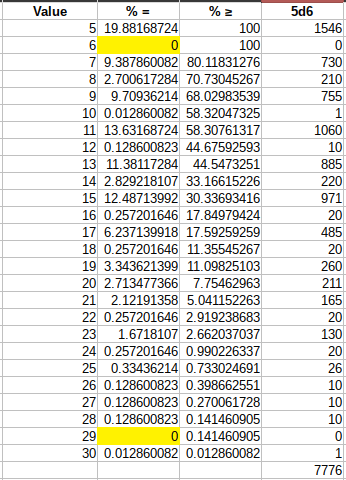This is the description I found on the troll dice roller website about a novel dice mechanic. An anonymous person was experimenting with an idea for a GURPS magic system using the site. The mechanic was documented this way:
Experiment with a custom magic-system in GURPS using HP as blood sacrifice, using 2-10 d6.
Doubles, triplets and above count as their value, lonely dice only add +1 per dice.
a roll with 5 dice [4,5,5,2,6] will make 1+5+5+1+1=13.
I immediately played with various numbers of dice and wrote scripts for d8s, d10s, and d12s. Yet after all that, I was drawn to 5d6. It reminded me of Dice Throne and ultimately Yahtzee. I had to admit that I was drawn to this idea using 5d6 because of the endless games of Yahtzee and Kismet I played as a kid. That shared memory makes this dice mechanic feel intuitive through repetition.
This is the point where my co-worker would say that my Nerd is showing.
When I began looking at the probabilities, however, it inspired me for possibilities in my home game with the kids, retroclones, and various other games. For the curious, here's a handy table.

At this point, my co-worker would use their teacher voice and talk about all the work they need to do.
The next few posts are going to explore how this dice mechanic can be used in 5e and other role-playing games. It not only provides an interesting sub-system, but it can be a part of the world-building. Specifically, I'm going to look at using this to build a bolt-on and hopefully simple way to make magic different.

 RSS - Posts
RSS - Posts RSS - Posts
RSS - Posts